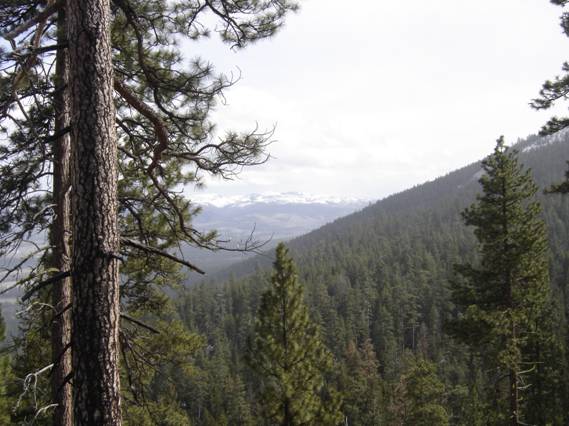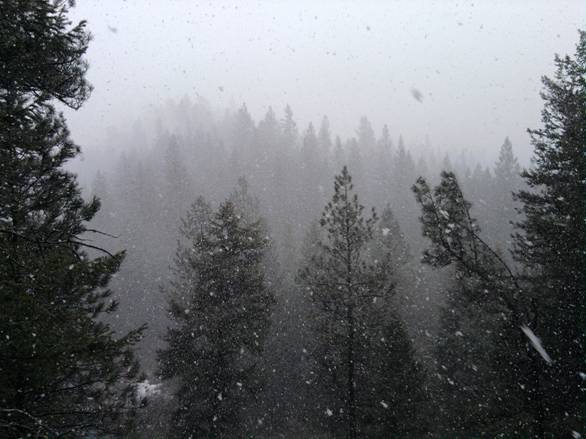
| current issue |
| archives |
| submissions |
| about us |
| contact us |
| short story competition |
sponsored by
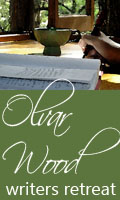
Who Moved My Trees?: Nature Writing with Rick Bass Inga Simpson |
|
|
In April this year, I travelled to the other side of the world to participate in a five-day environmental writing workshop. That’s quite a carbon footprint for a short gig, I know. There is, however, a dearth of nature or environmental writing courses in Australia, and this one was led by one of my favourite writers, Rick Bass (The Lives of Rocks, The Ninemile Wolves, Winter, Why I Moved West), in his home state of Montana. From Seattle, an Alaskan Airways Dash-8 carried me southeast, peering out my little window at the northern Rockies, which were covered in snow. The plane had to come about to fly in low through the mouth of the Missoula Valley. The town of Missoula itself is flat, sprawling out over what was once the bed of an enormous glacial lake. You can still see the wave-cut shorelines on the sides of nearby Mount Sentinel and Mount Jumbo, tide marks from one of the world’s most significant flood events at the end of the ice age. Missoula, Montana, may not ring a bell, but you’ve probably read A River Runs Through It (Norman McLean) or seen the film (one of Brad Pitt’s earliest), which gives you some idea how beautiful it is. The Clark Fork, Blackfoot and Bitterroot rivers converge in Missoula, and fly fishing is still a primary recreational pastime. I walked over the rushing Clark Fork to class every morning, surrounded by snow-capped mountains. The Environmental Writing Institute (EWI), now in its 20th year, is sponsored by the University of Montana’s highly regarded Environmental Studies Program, with writing just one of the options for specialisation. Each year, the university runs the application-based workshop, bringing in an established environmental writer to facilitate. Rick Bass writes fiction as well as non-fiction, lives in the Yaak Valley, in the far north of the state, near the borders of Canada and Idaho. He hadn’t taught the course for many years, driven in from the cold, perhaps, by lean times in the publishing world, which was why I flew so far for the rare opportunity to work with him. The university assigned a grad student, Lauren, to meet me at the airport, and take me to my accommodation – Blossom’s Bed and Breakfast – all of which provided a warm welcome on a cold evening. Lauren was the only workshop participant to have been to Australia, which is perhaps why she was matched with me. I’m sure I was the most work, too, asking lots of questions and, carless, needing lifts all about town. April in Montana is officially ‘spring’ but far colder than a Queenslander’s winter. Although I saw students in shorts and thongs(!) winter was having an even harder time letting go than usual; the ski season had just been extended for another fortnight. Locals fussed about the lower hillsides still being brown, and the trees not yet budding, and deer coming down to graze on their gardens’ tender shoots, stressing that everything was usually green and flowering by now. EWI 2011 began with a welcome dinner. Phil, the head of the Environmental Studies program, and his wife, played hosts, their dining table laden with gourmet pizza and local wines. I stumbled through shaking Rick Bass’s hand and a first clumsy sentence. Just over half of the other writers were masters students from the Environmental Studies Masters program. The remainder were other ‘mature’ writers from all over, including Oregon, California, and Colorado. My visit made for a relative Australian convergence on Missoula, as only a week or so earlier, Australian nature writer and poet, Mark Tredinnick, had taught a seminar and discussed his book, The Blue Plateau, on the reading list for the masters program. The students had clearly been impressed, and were keen find out if I knew Mark and to discuss his work and the Australian landscape. The sun set impossibly late, soft light lingering until after eight-thirty, and we sipped wine with one eye on each other and one on the view over the valley. Conversation stopped as we watched a storm come in, bringing sleet then rain. Rick crouched on the hearth of the enormous open fireplace to address us, giving words to the shared passions that had brought us together and warning us of the ‘fungus’ of depression than can come with caring too much. Later, Lauren drove me to a venue downtown where Rick was to do a reading: a fundraiser for the Yaak. She turned the heating in her car right up in response to my huffing and puffing over blue hands. “I met Rick Bass!” I said. “And no one can ever take that away from you.” We grinned into the night. Lauren had come west at the start of the year, from Wisconsin, and her stay would be much longer, but our journeys intersected in this place. She had journeyed to Australia’s red centre, a few years before, and here was I in US mountain country.
The format for each workshop was a conversation, led by Rick, critiquing each writer’s submission. The rest of us chipped in more and more as the sessions went on, gaining in confidence and getting to know each other better. The starting point was to find a ‘title’ for each essay, one or two words that summed up what it was really about. From there we would tease out the central metaphor or theme, pull apart the structure, identify the point of conflict and so on, making a kind of map of the story on a whiteboard. From there we offered constructive suggestions for developing the piece further. Larger lessons emerged from the process. “Y’all have got to inhabit the subconscious,” Rick would say, “get right down into that fertile, organic, subconscious mud.” In my one-on-one session with Rick I expressed some anxiety about the essay format. His shrugged response (“they’re all just stories”) suggested worrying less about a set structure or argument, instead thinking of it as a story that is mostly true. It’s a little thing, but it really freed me up to apply the skills and techniques I use in writing fiction to my non-fiction. Pulling apart all those pieces of environmental writing was a critical process, though not as fierce as I had heard US writing workshops can be. I found myself offering more positive feedback, somewhat defensively at times, for what I felt were, in several cases in particular, very strong pieces of writing. There was a lovely story about an experience with seals, and a searing account of polar bear tourism I will never forget. The grad students were an impressive bunch of people, focused, eloquent, well-informed and thoughtful, with a wide variety of experiences, and a youthful energy. They were planning their summer breaks while I was there, all doing something impressive, like ‘floating’ (canoeing) the Yukon, or working in Alaska, or travelling to South America. I was plain jealous of the richness of their peer group and their course, which sounded wonderful to me – not that I could imagine myself living through a Montanan winter. The mix of students and older writers from all over worked well, challenging all of us, with so much common ground, to do more and write better. My ‘foreign’ presence broadened discussion, too, requiring cross-cultural clarification and explanation of differences in relation to forestry management, for example. It is remarkable how much room for confusion there is between people speaking the same language. While I understood almost everything my classmates said – conditioned, of course, by American television and film – they often had a lot of trouble understanding me. When I asked, “Is that snow?” at the first swirling white precipitation framed in the picture windows behind Rick, he thought I had said “What’s that smell?” It wasn’t just my accent, which, admittedly, carries a rural twang equivalent to a Montanan rancher’s. Words and terms are different; where I say mining, they would say extraction, where I say whinging, they would use whining, and so on. I have read so much American nature writing that I was familiar with many of their plants, animals and geography. So much so that when I saw maze-like tunnels near the edge of the snow, the word vole just popped into my head, as if from my muddy subconscious. I absorbed new terms, like “trailhead” (the starting point for a walking trail) and “switchback” (a zig-zagging trail gradually climbing a steep slope rather than heading straight up) with relish, taking notes and drawing little pictures. The piece of writing I submitted for the workshop – an extract from a longer work about Olvar Wood – with its wet sclerophyll forest, bloodwoods, lantana and references to poet, Judith Wright, left some of my classmates unable to picture the place I was describing. Worse, my central concept, of this kind of regrowth as ‘mongrel country’ was a failure. I tried to explain that mongrel conveys a tough, fighting quality, going into a long anecdote about tennis player, Leyton Hewitt, with no success. “Nope,” they said. “A mongrel is an inbred dog.” It was a valuable lesson in what translates for non-Australian audiences and what does not. As you would expect, the workshop included much discussion of environmental issues, writing markets, and the future. Our ‘complicity’ in the very environmental issues we are outraged by was a big area for exploration, offering up complex and thoughtful pieces. This reflects a broader shift evident in current environmental publications, a progression beyond absolutist statements about what is wrong, to a more considered analysis of the ways our lifestyle choices and the daily decisions we make – on an individual and societal level – impact on the environment.
The most valuable thing I took away from the course was more subtle: Rick’s quiet message about personal integrity and really inhabiting your writing, finding the resonance between yourself and the place (or plant, animal, issue) you are writing about. Apart from his capacity with words, and his sensitivity to nature, the reason I respect Rick so much is his authenticity. “I go for depth, not breadth,” he said more than once. Unlike many nature writers, Rick actually lives in nature year round. It’s tough sometimes, and the Yaak Valley, for all its beauty, is damm tough in winter. Rick has fought for the place, too, for more than twenty years, trying get it protected, at considerable personal cost. When I look back over my notes, this authenticity is evident even in his way of speaking. Rick’s writing advice was all grounded in nature. “What really gravels me about so much nature writing…” he’d say. Or “Y’all need to avoid the headwind of predictability.” He warned that quoting other writers can be a “blocktrail.” This particular tip was while discussing my writing. I had quoted another (well published and highly regarded) nature writer’s description of driftwood within my own, and Rick suggested the piece would be stronger without it. “Your writing is better than his. Are you trying to make him look bad or what?” Well, it was worth travelling 20 000 miles just to hear that. On the second last afternoon, most of the class headed out on an excursion, eager, after so much time indoors discussing nature, to get amongst it. We drove, convoy style, through the Bitterroot Valley, about fifty miles, and cut through backroads to Blodgett Canyon. We saw deer and a marmot before we even reached the trailhead. We set out, although rain threatened and Lauren was due back in town to celebrate her birthday. My classmates pointed out huckleberry, a rust-coloured holly, and pink-stemmed dogwood, as well as the luminous green wolf moss along the way. The trail offered up vistas of the valley below as we climbed higher.
Woodpeckers and flickers rat-a-tat-tatted all around us we struggled through snow across steep ground. A classmate in her eighties left me far behind. The impact of last summer’s bushfires, which some of the second year students had watched raging from Missoula, was evident in the dead and blackened trunks about us. Late in the afternoon, just after seeing a rainbow suspended in mid-air, we came to a dramatic rocky overlook. The wind rushed up, fluttering at our jackets, as we posed for a group photograph, and shared water and snacks. In the final session of our workshop, Mitch, from Oregon, moved from his ‘usual’ seat by the windows. This had a flow-on effect, upsetting everyone’s position selection, most of us having settled on particular spots. We shuffled about, laughing at how settled we had become in such a short time, and at our difficulty adjusting. I asked if anyone knew the book, Who Moved My Cheese, which more than one person has given me over the years. A few minutes later, in one of the delayed responses we had almost grown used to, Rick laughed out loud. “Oh, Who Moved My Cheese?” he said, slapping his legs. “With your accent, I thought you said Who Moved My Trees! Like, what fucker clearcut my trees!” I stayed on awhile in Missoula after the workshop, to climb Mount Jumbo and hike in the Rattlesnake Valley. On the return leg of my final (18 mile) hike, a snowstorm came in, thick flakes eddying all around, making me laugh out loud (possibly with exhaustion) as I tried to capture them in a photograph.
Can two weeks change your life? I went to Montana focussed on the opportunity to work with Rick Bass, but took away a much larger experience. I could not have anticipated, from my studio at home, the nourishment that would come from the friendship and support of like-minded writers, being surrounded by mountains, walking in wilderness I had only read about, and participating in such a focused workshop taught in the language of nature writing.
About the Author
Inga teaches an online nature writing course through Olvar Wood Online (OWL) running from 1 July to 30 September.
|
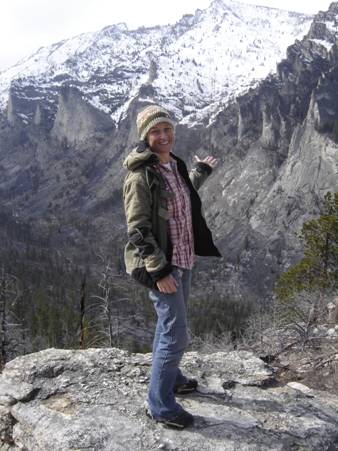
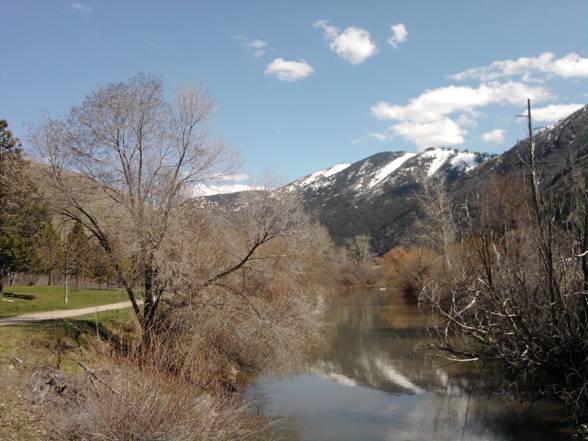
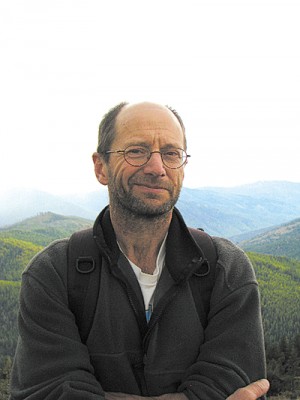 In terms of environmental writing, or writing for advocacy, Rick spoke a lot about the balance between what you give the reader and what you take away. A short story – a well-written one, at least – only gives something to the reader; the gift of story. Asking the reader to engage with an issue and take some sort of action is a much bigger ask. In some ways, then, the quality of the writing – the beauty of the words and sentences, the success of the central metaphor, the evocation of place – is even more important than in fiction.
In terms of environmental writing, or writing for advocacy, Rick spoke a lot about the balance between what you give the reader and what you take away. A short story – a well-written one, at least – only gives something to the reader; the gift of story. Asking the reader to engage with an issue and take some sort of action is a much bigger ask. In some ways, then, the quality of the writing – the beauty of the words and sentences, the success of the central metaphor, the evocation of place – is even more important than in fiction. 